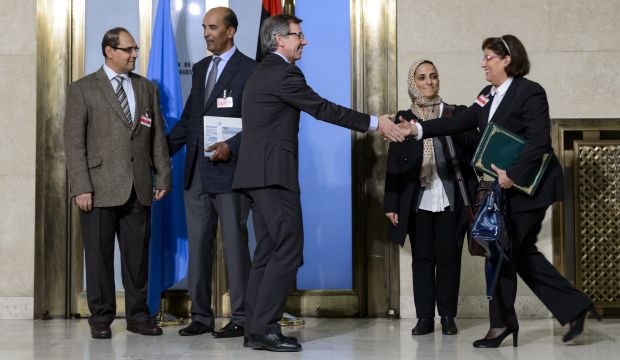
United Nations special envoy to Libya Bernardino León (C) welcomes representatives of Libya's warring factions prior to talks in Geneva, on January 14, 2015 (AFP Photo/Fabrice Coffrini)
Cairo, Asharq Al-Awsat—The UN-sponsored talks between Libyan rivals gathered in Geneva will not produce a solution for the crisis in the North African country, a senior Libyan official told Asharq Al-Awsat this week.
A member of the cabinet of Libyan PM Abdullah Al-Thani, who requested anonymity because he was not authorized to brief the media, said: “It is a waste of time. Everyone knows that the crisis can only be resolved militarily. The Geneva dialogue will fail due to the strictness of the extremists who control the capital Tripoli.”
The talks, which began on Wednesday, are supposed to bring together representatives from the Islamist-led government based in Tripoli and representatives of Thani’s internationally recognized parliament based in Tobruk.
In August an alliance of Islamist militias, dubbed Libyan Dawn, seized control of Tripoli and announced its rejection of Thani’s elected government. The Islamist insurgents reinstated the outgoing General National Congress (GNC) as the official parliament and established their own government.
The minister’s remarks contrasted with the optimism expressed earlier by the UN’s envoy to Libya, Bernardino León, who said the talks were aimed at reaching a political settlement that would lead to the formation of a national unity government supported by the majority of Libyans.
In a press conference before the beginning of the talks, León called on Libya’s rival factions to observe a ceasefire during the negotiations, and said that more factions were welcome to join the negotiations.
However, the Tripoli government said on Wednesday that any representatives of areas under its control attending the Geneva talks did not speak on its behalf.
“All heads of municipalities and members of municipal councils taking part in the talks only represent themselves,” it said in a statement.
The statement went on: “The GNC, as the [country’s] supreme power, [solely] possesses the mandate to represent the Libyan people in political affairs.”
The statement confirms earlier reports by Asharq Al-Awsat that the members Libyan Dawn were split over the UN-backed talks.
